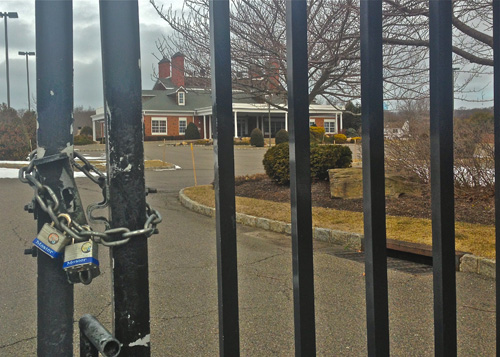Sale pending for Great Rock, Blackwells

Great Rock golf course and Blackwells restaurant, which occupy the same property in Wading River, have been closed since January and one of the property owners says the complex will likely be sold soon.
“There’s a sale pending,” said Paul Elliott, a principal in the group that owns the property.
Mr. Elliott said he could not disclose any details about the buyer just yet.
Great Rock is the second golf course in Riverhead Town to close in the last few months. Calverton Links closed in late October and it’s uncertain what the future of that course will be.
The owners of the Great Rock course have been involved in several lawsuits over the years, including some with the town, with neighbors and with creditors.
The property, listed on tax maps as Insurenewyork Agency LLC, also has been in tax default for the past three years, with $147,849 owed as of December, according to town records.
The Great Rock development dates back to 1994, when Mr. Elliott and another investor purchased 286 acres just north of Sound Avenue to build a residential community around an 18-hole golf course.
By 1999, work on the course had begun and the 140 residential lots had been sold. The homes were built by 2005.
The course’s owners had publicly mentioned the operation’s potential demise in 2010.
In May of that year, Riverhead Supervisor Sean Walter announced at a Town Board meeting that the property owners had told him both the course and Blackwells restaurant would shut down within three months unless they were permitted to build 54 golf villas on the property.
At that time, the supervisor proposed a public meeting to discuss the idea of allowing the villas or finding other ways to save the course, but that met with opposition from some neighbors at Town Board meetings and even from members of the conservative 9-12 group, who called it a “corporate bailout” when Mr. Walter addressed the group.
Great Rock’s owners, meanwhile, said at the time that they had canvassed the neighborhood and gathered 100 signatures on a petition in favor of holding the public meeting.
By the end of May 2010, Mr. Walter said he no longer supported the idea, in part because a Great Rock representative had said in a News-Review interview that the company would not be going out of business in three months.
Mr. Walter declined comment on Great Rock this week because of ongoing litigation between the town and Great Rock over a proposed expansion of the course’s clubhouse.
In 2012, Great Rock sued Riverhead Town in federal court for $25 million, claiming it had reneged on a promise made in a 2009 settlement of a previous lawsuit with Great Rock, which said the town would rule on amended plans for the clubhouse expansion within 62 days of receiving them. It did not.
That lawsuit is still pending.
Also in the last few years, some neighbors had complained about amplified music and other quality of life issues related to catered events held at the course.
“This is a nice quiet community and I think most of us who live here hope to see the site reopen soon as a golf course that peacefully and respectfully coexists with us,” said the most vocal neighbor, Dominique Mendez, who went on to help found the Riverhead Neighborhood Preservation Coalition. “I anticipate that the next owner will come in with a realistic business plan that doesn’t rely on prohibited expansions that would impact the surrounding neighborhoods.”
The Riverhead Neighborhood Preservation Coalition and a few individual Wading River residents filed a lawsuit in 2011 seeking to prevent the town Planning Board from ruling on Great Rock’s application for a clubhouse expansion. But that lawsuit was filed before the Planning Board had even ruled on the application, and a judge dismissed it.
Another lawsuit was filed in 2011 by four creditors of the project, Thomas Costello, Douglas Pierce, Forrester Pierce and Gregory Pierce, who claimed Mr. Elliott and other owners of the property defaulted on a $2.9 million loan they received when Mr. Elliott’s group repurchased the property from Mr. Costello’s group in 2006.
Mr. Elliott’s company intended to build another 55 homes on the land to help pay off that loan, but learned in 2009 that a 1997 covenant on the property limited the number of homes that could be built there to 140, according to court papers. Mr. Elliott said at the time that he was unaware of the restriction, despite the fact that his signature was on the agreement that contained it.
He claimed in court papers that he was never made aware of the restriction prior to the sale.
Mr. Elliott said he believes the lawsuit against the town will not be affected by the sale of the property, but declined comment on the lawsuit brought by creditors.








